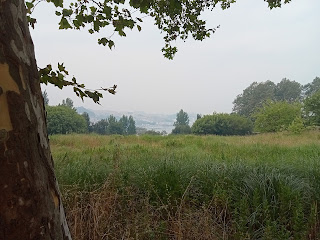For years while curating and directing
Bury Art Museum and the Text Festival, I mostly put my own work on the
backburner. My first publication 50 Heads (downloadable version here) was only written in 2006 because I
was able to take a sabbatical, and was mostly written in Iceland, Netherlands, Japan
and Italy. This became one of the features of subsequent publications with them
written around the world at a creative distance from the day job. My second
book was eponymously located in Reykjavik alongside my exhibition (alongside Dan
Flavin & Alan Charlton) at Safn.
 |
| Reykjavik cover |
Space The Soldier who died for
Perspective (Veer Books) is even
structured in sections identified for the location they were written or
installed (Tampere, Berlin, Bertinoro, Melbourne, Budapest, Edinburgh). By the
time my Bury projects had reach China my workload was so great that I sort of
announced my retirement from writing with The End of Poetry .
So leaving Bury meant I could finally give
my own work the concentration I had only been able to squeeze in for the last
20 years. Leaving the fetid corruption and racism of Brexit England gives me
the context to quote Robert Graves that I have waited 40 years for: “Goodbye to
all that”.
So moving to Porto gives me one of the things
that I find conducive for writing - detachment. The ill-health that triggered
my retirement decision plus the pandemic made initial concentration difficult.
And with my previous propensity to find a theoretical framework for my
(curatorial) practice, one of the first things I distracted myself with was researching
the answer to the problem I identified in Poetry as Thoughtcrime - in
brief:
‘In this historic moment of crisis, where the
omniscient capitalist lying data-god turns us into the raw material it consumes -
Poetry is Thoughtcrime. But how do you commit that crime when every thought is
predicted, manipulated and commodified?’
I’m happy to say that I conceived a theory for
the future of poetry and, by extended logic, other artforms. I shared an
initial Manifesto with a handful of similarly-concerned artists and have it mostly written
in what would have been my first post-Bury book - Poetry as Thoughtcrime. Then I had cause to pause.
If I’d still been in Bury and curating, the theory would have formed the basis
for a Text Festival, but I realised that this was just a habit of thought and
that now I was not in Bury or curating, it was time for me to apply my analysis to my own work rather than providing a forum or a context for others -
that can come later. In part as a deferment and part a compromise, I moved onto
the second book, which would be the transition in literary practice. It struck
me that frequently in history philosophers have ‘inserted’ a ‘prequel’ work to
their major discovery that seeks to explain their methodology for their
breakthrough later work. So I set off write my first poetry book since 2012
calling it In Search of Method. Let the book’s own introduction explain:
In Search of Method
In Search of Method is a lie.
In Search of Method is the conceit of sequential philosophers.
Jean-Paul Sartre called his 1957 precursor to the ‘Critique
of Dialectical Reason’:
‘Search for a Method’.
The Rules of Rene Descartes’ ‘Discourse on Method’
contain the most detailed description of his method but
magically
for the Search for Method, he never completed it, and never
refers to it
in his published writings or correspondence. Alain Badiou, in
‘Logics of Worlds’
pauses before the launch, his stepping off - “Once
we are in possession
of a Greater Logic, of a completed theory of worlds and
objects, it is possible to examine on its own terms the question of change,
especially the question of radical change, or of the event”.
They all do. Writing their method is to already know where it
will end,
“we will adopt a method of maximal interiority”
“to show from the outset
that which is only fully intelligible at the end”
The Search for Method is the rigorous path of the poet.
So my poetic investigation tests four
methods of (re)searching:
Lévy Flight - the evolutionary
approach, favoured by sharks and people who are lost.
Descartes’ Rules based methodology.
Seeing To It That (STIT) Theory - The contemporary
theoretical system parsing the nature of knowing and action.
Separation & Lapse method
developing the Anthropology of the Name, Sylvain Lazarus’s seminal
investigation of thought.
Except for the conclusion, this book is
near enough finished now too.
I’ve been invited to curate an
intervention for Synapse International and expect to structure it around the Search
of Method, plus pointing the direction of my new theories. And I’ll be doing an
online work called The Answer on Rachel Defay-Liautard’s maintenants-synapse
Despite all this apparent precedence
for poetic output, not a lot of people know that my decision to write poetry
originally was only because it was quicker to write than fiction. So more
importantly and exciting for me, I am just completing my first novel in years, The Family
Idiots, and have made a start on my second, Urim.
A couple of other things are floating
around. I’ve just written a foreword for a collaboration between Rachel
Defay-Liautard between Marton Koppány, and I’ve been invited by MarshaMacDonald to work on a limited-edition broadsheet, which will be called Hurry/Depression.





